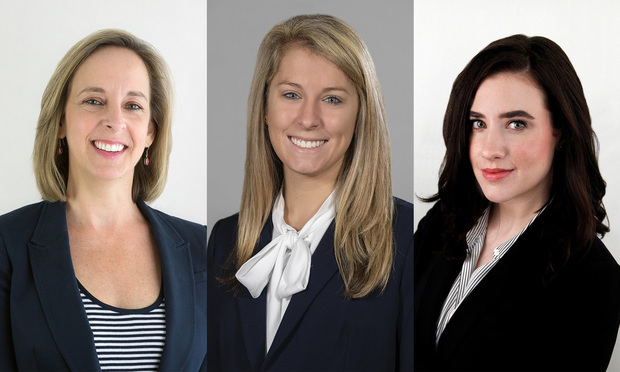Adding '.com' Changes Everything, or Does It? Updates in Fourth Circuit Trademark Law
Can the combination of a generic word and a generic website ending like ".com" create something distinctive enough to be trademarked? When does a large company's attempt to reduce confusion with a smaller business' slogan actually result in more confusion?
January 08, 2020 at 11:05 AM
9 minute read
 (L to R) Melanie Dubis, Sloan Carpenter and Catherine Lawson, Parker Poe (Photo: Courtesy Photo)
(L to R) Melanie Dubis, Sloan Carpenter and Catherine Lawson, Parker Poe (Photo: Courtesy Photo)
 Can the combination of a generic word and a generic website ending like ".com" create something distinctive enough to be trademarked? When does a large company's attempt to reduce confusion with a smaller business' slogan actually result in more confusion? And should a company that wins an argument with the government still have to pay Uncle Sam's attorney fees?
Can the combination of a generic word and a generic website ending like ".com" create something distinctive enough to be trademarked? When does a large company's attempt to reduce confusion with a smaller business' slogan actually result in more confusion? And should a company that wins an argument with the government still have to pay Uncle Sam's attorney fees?
Judges in the U.S. Court of Appeals for the Fourth Circuit recently answered those important questions for the world of trademark law, and the U.S. Supreme Court has agreed to consider some of their answers. The rulings in Booking.com v. United States Patent and Trademark Office and Fleet Feet v. Nike have significant implications for the intersection of trademark law and the internet, the competition between larger and smaller businesses, and the cost of being right.
Booking.com and Paying Back Uncle Sam
The Supreme Court will hear arguments this year over Booking.com's attempt to trademark BOOKING.COM, which the Fourth Circuit signed off on last February. The key question posed by the case is whether two generic terms—which separately could not be trademarked—may be trademarked when combined.
Booking.com, a website on which customers book travel and hotel accommodations, has operated under that name since at least 2006. In 2011 and 2012, the company filed four trademark applications for BOOKING.COM. The trademark question before the Fourth Circuit was whether there should be an automatic rule that adding a top-level domain (i.e., ".com") to a generic second-level domain (in this case, "booking") can never yield a non-generic mark.
The court rejected this extreme approach based on its consideration of the policy underlying trademark law and the evidence submitted by Booking.com. The court's analysis unfolded against the backdrop of the significant consequences faced by an applicant whose mark is determined to be generic. Once a mark is deemed generic, whether by a court or based on public evidence, the mark can never receive trademark protection. Given the severity of this outcome, the court formally held that the USPTO bears the burden of proving that a mark is generic and rejected an automatic, prohibitive rule.
But the court also refused to automatically protect domain names submitted as trademarks. Instead, whether BOOKING.COM could receive trademark protection ultimately turned on what the record showed about the public's understanding of the mark as a whole. The USPTO did not submit convincing evidence that the public used the phrase "booking.com" for purposes other than using the website Booking.com, which failed to meet the USPTO's burden of proving genericness. More persuasive, however, was a methodologically-sound survey submitted by Booking.com that showed that 74.8% of respondents identified BOOKING.COM as a brand name, not a general reference to hotel reservation websites. The court emphasized that this type of survey was "strong evidence" that the public understood that BOOKING.COM referred to the source of the proffered service for booking travel and hotel accommodations.
Based on these facts, the court held that the combination of "booking" and ".com" in this case created the protectable trademark BOOKING.COM. But it was not a complete win for the company. As a secondary issue in the case, the Fourth Circuit considered whether Booking.com could be required to pay the USPTO's attorney fees even though it won its appeal.
Under the Lanham Act, a trademark applicant may appeal an adverse decision by the USPTO either in front of the Federal Circuit or by initiating an action in a federal district court. If the applicant goes to the Federal Circuit, the only evidence that may be considered is what was before the USPTO in the application. But if the applicant initiates a lawsuit, it may present new evidence supporting its application. Booking.com did not have its consumer survey when it applied for its trademark before the USPTO, so it sued in federal court in Virginia to introduce the (very persuasive) survey.
Numerous courts have called into question existing Fourth Circuit precedent that holds that a prevailing party in a trademark appeal may still be required to pay the USPTO's attorney fees. However, the Fourth Circuit stuck to its own precedent and required Booking.com to pay the prorated salaries of the USPTO's attorneys and paralegals.
Nike, Fleet Feet and a Confusing Attempt to Clarify
Nike was ordered in December to pull its marketing campaign using the phrase "Sport Changes Everything" after national retailer Fleet Feet successfully argued that Nike was likely infringing its trademarks, "Running Changes Everything" and "Change Everything." Even though Nike's short-term use of "Sport Changes Everything" was calendared to end in February 2020 after the Super Bowl, Nike has been in litigation for most of the marketing campaign's existence.
In granting Fleet Feet's motion for a preliminary injunction, the Middle District of North Carolina discussed the typical factors considered when determining whether there is a likelihood of confusion between two trademarks, including the commercial strength of the marks, the similarity of the marks to consumers, the parties' intent, and six other factors.
Most frequently, confusion is established through "forward confusion" where the "junior" or new user attempts to ride the coattails of the "senior" or older user's already established trademark and branding. However, in its analysis, the Middle District found "reverse confusion," meaning that Nike, as the "junior user" or new trademark, out-advertised and out-promoted Fleet Feet, as the "senior user" or old trademark, and caused consumers to believe that Fleet Feet's trademarks were associated with Nike.
For instance, in its discussion of the commercial strength of the marks, the court found that Nike's "Sport Changes Everything" mark had greater commercial strength even though it has only been in use for six months, compared to Fleet Feet's use for over six years. In support of this finding, the court cited to Nike's great resources such as sponsored athletes, nationally televised sporting events, and $16 million dedicated to the "Sport Changes Everything" marketing campaign alone. Nike receiving unsolicited press coverage of its "Sport Changes Everything" mark also contributed to Nike having greater commercial strength.
The court also determined that consumers would find Nike's "Sport Changes Everything" mark similar to Fleet Feet's "Change Everything" and "Running Changes Everything" marks. Nike put forth evidence that it attempted to distinguish its mark by frequently pairing the slogan with its name or the Nike "swoosh" (Fleet Feet's marks are generally displayed alone, without any identifier). However, Nike's effort to distinguish its mark with its company name actually favored Fleet Feet—the court found that the pairing of "Sport Changes Everything" "with the Nike name or 'swoosh' … increases the likelihood of reverse confusion as consumers are likely to associate Fleet Feet's similar marks with Nike instead of Fleet Feet." Thereby rendering Nike's source identifier useless or, worse, problematic.
Further, while there was no evidence that Nike conducted a trademark search prior to commencing its marketing campaign, the court inferred that Nike conducted a search, the results of which would have included Fleet Feet's "Running Changes Everything" and "Change Everything" marks, and still proceeded with the potentially problematic phraseology, actions that weigh in favor of Fleet Feet.
While Nike has appealed to the Fourth Circuit, it has not yet stated its grounds for appeal. As the lower court granted the preliminary injunction in part due to Fleet Feet not having a remedy after the marketing campaign's planned end in February 2020, Nike may just not do it. Or the Fourth Circuit may have a hotly contested trademark case on the horizon.
Takeaways
The two cases provide practical takeaways for businesses and other organizations in the Carolinas, the Virginias and Maryland. And once the Supreme Court rules on Booking.com, some of the lessons learned will apply nationwide.
Companies considering whether to seek trademark protection for their web address should consider the risk of a finding of genericness, whether the mark as a whole—.com or top-level domain included—is understood by the public as signifying the source of the company's product or service, and what evidence can be marshaled to demonstrate that understanding. If the Supreme Court finds Booking.com's survey as persuasive as the Fourth Circuit did, companies should consider doing their own methodologically-sound review of public opinion. And until the justices rule, businesses who choose to appeal a trademark decision in a Fourth Circuit court should budget to pay the government's attorney fees, win or lose.
Fleet Feet v. Nike also offers valuable lessons while awaiting review by the Fourth Circuit. Businesses should always conduct due diligence and play devil's advocate before launching a new trademark, even if it will only be used for a short-term campaign. In addition, huge businesses should take note of the ironic consequence of Nike paring its name or logo with "Sport Changes Everything." The bigger the business, the more cautious it should be in using a trademark that is vaguely similar to another one, as larger companies may have the popularity and power to cause confusion.
Melanie Dubis, Catherine Lawson and Sloan Carpenter are attorneys with Parker Poe in Charlotte, North Carolina. Melanie leads the firm's Business Litigation Team. Catherine litigates business and intellectual property cases. Sloan focuses on intellectual property rights and disputes.
This content has been archived. It is available through our partners, LexisNexis® and Bloomberg Law.
To view this content, please continue to their sites.
Not a Lexis Subscriber?
Subscribe Now
Not a Bloomberg Law Subscriber?
Subscribe Now
NOT FOR REPRINT
© 2025 ALM Global, LLC, All Rights Reserved. Request academic re-use from www.copyright.com. All other uses, submit a request to [email protected]. For more information visit Asset & Logo Licensing.
You Might Like
View All
How We Won: BraunHagey’s $56M Trademark Win Over Molson Coors Upheld by 9th Circuit
8 minute read
'Immediately Stop Using' Pizza Puffs Term: Parties at Odds Over Judge's Injunctive Order Over Trademark

'Water Cooler Discussions': US Judge Questions DOJ Request in Google Search Case
3 minute read
Old Laws, New Tricks: Lawyers Using Patchwork of Creative Legal Theories to Target New Tech
Law Firms Mentioned
Trending Stories
- 1'It's Not Going to Be Pretty': PayPal, Capital One Face Novel Class Actions Over 'Poaching' Commissions Owed Influencers
- 211th Circuit Rejects Trump's Emergency Request as DOJ Prepares to Release Special Counsel's Final Report
- 3Supreme Court Takes Up Challenge to ACA Task Force
- 4'Tragedy of Unspeakable Proportions:' Could Edison, DWP, Face Lawsuits Over LA Wildfires?
- 5Meta Pulls Plug on DEI Programs
Who Got The Work
Michael G. Bongiorno, Andrew Scott Dulberg and Elizabeth E. Driscoll from Wilmer Cutler Pickering Hale and Dorr have stepped in to represent Symbotic Inc., an A.I.-enabled technology platform that focuses on increasing supply chain efficiency, and other defendants in a pending shareholder derivative lawsuit. The case, filed Oct. 2 in Massachusetts District Court by the Brown Law Firm on behalf of Stephen Austen, accuses certain officers and directors of misleading investors in regard to Symbotic's potential for margin growth by failing to disclose that the company was not equipped to timely deploy its systems or manage expenses through project delays. The case, assigned to U.S. District Judge Nathaniel M. Gorton, is 1:24-cv-12522, Austen v. Cohen et al.
Who Got The Work
Edmund Polubinski and Marie Killmond of Davis Polk & Wardwell have entered appearances for data platform software development company MongoDB and other defendants in a pending shareholder derivative lawsuit. The action, filed Oct. 7 in New York Southern District Court by the Brown Law Firm, accuses the company's directors and/or officers of falsely expressing confidence in the company’s restructuring of its sales incentive plan and downplaying the severity of decreases in its upfront commitments. The case is 1:24-cv-07594, Roy v. Ittycheria et al.
Who Got The Work
Amy O. Bruchs and Kurt F. Ellison of Michael Best & Friedrich have entered appearances for Epic Systems Corp. in a pending employment discrimination lawsuit. The suit was filed Sept. 7 in Wisconsin Western District Court by Levine Eisberner LLC and Siri & Glimstad on behalf of a project manager who claims that he was wrongfully terminated after applying for a religious exemption to the defendant's COVID-19 vaccine mandate. The case, assigned to U.S. Magistrate Judge Anita Marie Boor, is 3:24-cv-00630, Secker, Nathan v. Epic Systems Corporation.
Who Got The Work
David X. Sullivan, Thomas J. Finn and Gregory A. Hall from McCarter & English have entered appearances for Sunrun Installation Services in a pending civil rights lawsuit. The complaint was filed Sept. 4 in Connecticut District Court by attorney Robert M. Berke on behalf of former employee George Edward Steins, who was arrested and charged with employing an unregistered home improvement salesperson. The complaint alleges that had Sunrun informed the Connecticut Department of Consumer Protection that the plaintiff's employment had ended in 2017 and that he no longer held Sunrun's home improvement contractor license, he would not have been hit with charges, which were dismissed in May 2024. The case, assigned to U.S. District Judge Jeffrey A. Meyer, is 3:24-cv-01423, Steins v. Sunrun, Inc. et al.
Who Got The Work
Greenberg Traurig shareholder Joshua L. Raskin has entered an appearance for boohoo.com UK Ltd. in a pending patent infringement lawsuit. The suit, filed Sept. 3 in Texas Eastern District Court by Rozier Hardt McDonough on behalf of Alto Dynamics, asserts five patents related to an online shopping platform. The case, assigned to U.S. District Judge Rodney Gilstrap, is 2:24-cv-00719, Alto Dynamics, LLC v. boohoo.com UK Limited.
Featured Firms
Law Offices of Gary Martin Hays & Associates, P.C.
(470) 294-1674
Law Offices of Mark E. Salomone
(857) 444-6468
Smith & Hassler
(713) 739-1250








